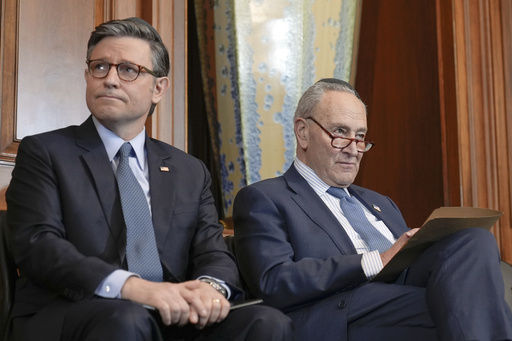
WASHINGTON — President-elect Donald Trump has unexpectedly dismissed a bipartisan agreement aimed at averting a government shutdown during the Christmas season. On Wednesday, he instructed House Speaker Mike Johnson and other Republicans to start negotiations anew, just days before the crucial deadline when federal funding is set to expire.
Trump’s unexpected involvement in this crucial matter has sent shockwaves through Congress as lawmakers strive to finalize their tasks and return home for the holidays. Consequently, Johnson is now in a race against time to forge a new plan before the impending Friday deadline that is essential to keeping the government operational.
In a collaborative statement, Trump and Vice President-elect JD Vance urged party members to “GET SMART and TOUGH.” They proposed an unrealistic combination of continued government funding alongside a contentious increase in the national debt limit — an aspect typically opposed by many within his party. “Anything else is a betrayal of our country,” they asserted.
Democrats reacted strongly to the GOP’s disruption of the temporary funding measure, which additionally included around $100 billion in disaster relief for states severely impacted by Hurricanes Helene, Milton, and other calamities. House Democratic Leader Hakeem Jeffries criticized the situation, stating, “House Republicans have been ordered to shut down the government, hurting the working-class Americans they claim to support. If you undermine a bipartisan agreement, then you must bear the consequences.”
The comprehensive 1,500-page bill was already hanging in the balance as right-wing conservatives dismissed the proposed increase in spending, influenced by Trump’s billionaire associate Elon Musk, who publicly denounced the plan just after it was released late Tuesday.
Many lawmakers expressed dissatisfaction with the proposed spending, which included their first pay raise in over a decade— a surprising development after a particularly unproductive congressional session. They awaited instructions from Trump on how to proceed with their votes.
Despite including crucial assistance for disaster recovery, totaling around $100.4 billion in response to this year’s hurricanes and other natural disasters, the budget-scrutinizing GOP remained unconvinced. Musk voiced his opposition early Wednesday on his social media platform X, stating, “This should not pass.”
This situation does not come as a shock to Speaker Johnson, who, like his Republican predecessors, has struggled to unify his party. The recurring inability of the conservative faction to endorse the routine operational necessities of the federal government, which they generally prefer to cut back on, is evident.
It highlights the challenges Republicans face as they prepare to govern while controlling the House, Senate, and White House. The reliance on Trump’s endorsement for successful passage of any legislative initiatives becomes clear. Retiring Senator Mitt Romney from Utah expressed confusion over Trump’s expectations, questioning whether Republicans are to support the continuing resolution or allow the government to shut down.
Musk, who is now heading a newly established Department of Government Efficiency, spearheaded the opposition, stating, “Any member of the House or Senate who votes for this outrageous spending bill deserves to be voted out in 2 years!” This is a significant warning from Musk, whose financial support was instrumental in Trump’s win and could turn political careers upside down.
Democratic Representative Jamie Raskin from Maryland criticized the situation, arguing, “This reveals the issue of a small elite controlling everything, leading others to feel intimidated by their wealth— which has become a tool for coercive influence.” With the Democrats having negotiated the final terms with Johnson and the Senate Republican leadership, they are expected to provide the necessary backing for passage, a common practice for significant legislation.
As the clock ticks down to midnight Friday, Senate Majority Leader Chuck Schumer emphasized the urgency, stating, “The sooner Congress acts, the better.” The proposed legislation plans to extend current government programs and services at existing operational levels for several more months, up until March 14, 2025.
This temporary funding measure is urgently needed due to Congress’s failure to pass annual appropriations for various federal agencies, covering everything from national security to health and welfare services. Following the conclusion of the fiscal year on September 30, Congress opted to address the issue temporarily by approving a short-term funding extension set to terminate this week.
However, the extensive bill includes additional provisions that lawmakers are attempting to pass before the year ends, especially as some officials prepare to leave office at the end of their terms. Representative Anna Paulina Luna from Florida dismissed it as a “junk sandwich,” while Representative Andy Harris from Maryland, chairman of the Freedom Caucus, voiced disappointment with the progress made over the past week.
Among the conditions within the package is the full funding required to rebuild Baltimore’s Francis Scott Key Bridge, which collapsed after being hit by a cargo vessel. The funding is expected to be reimbursed via insurance payments and legal actions.
Additionally, there is a proposal directing the transfer of land utilized by the old RFK Stadium from federal oversight to the District of Columbia, which could lead to the construction of a new stadium for the Washington Commanders.
Health care provisions within the legislation aim to extend telehealth coverage for Medicare recipients and curtail the profits pharmacy benefits managers, which negotiate drug coverage, can earn.
Furthermore, the bill contains measures aimed at countering China’s ambitions, expanding on President Joe Biden’s executive directive to limit investments in nations that threaten U.S. national security. Addressing these concerns has garnered bipartisan support within Washington, indicating a rare area of agreement among lawmakers.
